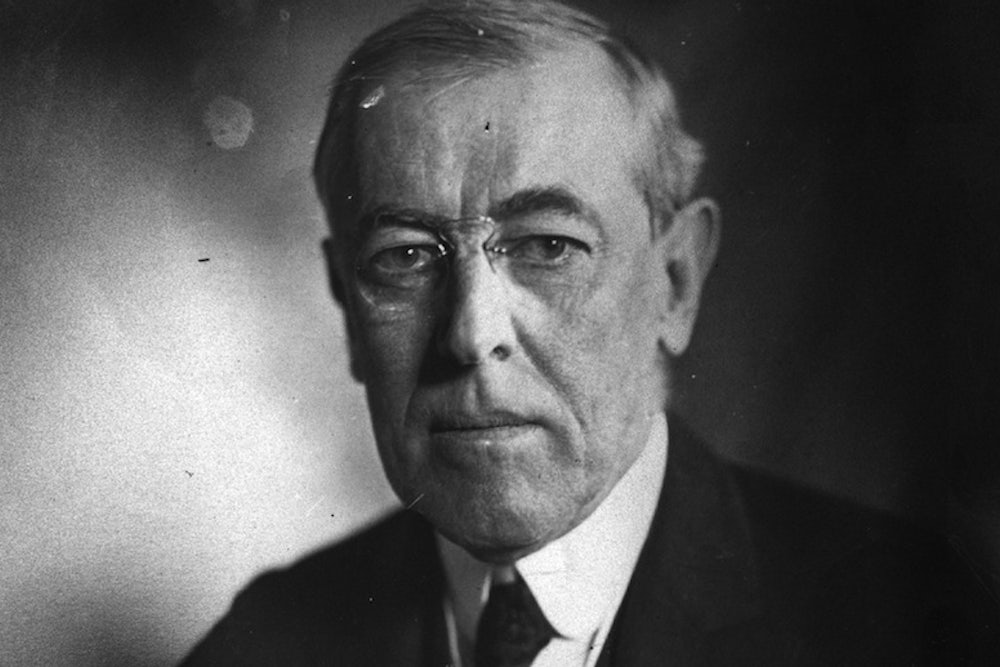This is the second entry in a debate between Michael Kazin and John M. Cooper over the United States' entry into World War I, which began one hundred years ago this month. Kazin teaches history at Georgetown University and is writing a book about American opponents of World War I. Cooper is the author of Woodrow Wilson: A Biography.
Anti-interventionists used to deride World War I as “Mr. Wilson’s War.” They called it right. The United States entered the war in April 1917 because Woodrow Wilson decided to take the country in. Germany’s submarine attacks, renewed two months earlier, had brought shrill demands for immediate intervention from such war hawks as Theodore Roosevelt and Henry Cabot Lodge, but every indicator of public and congressional opinion found most people clinging to what Wilson once called “the double wish of our people” to stand up to Germany and yet not get drawn into war.
Wilson chose war because, like some other presidents in similar situations, he believed there were no truly good choices. Neutrality seemed to him no refuge from the war’s damaging reverberations. He had already ordered naval protection for and the arming of merchant vessels against the submarines, which was tantamount to waging a naval war. Also, with the tsarist regime recently overthrown in Russia, the Allies now looked like a marginally more palatable set of victors. Above all, Wilson recoiled from being just a bystander. By becoming a belligerent and helping to decide the outcome of the war, he was wagering that he could play a leading part in shaping the peace to follow.
Shortly before the submarine attacks, Wilson had unveiled his grand design for a new world order to be achieved through a compromise settlement—“peace without victory”—and future guarantees of all nations’ independence, territorial integrity, and freedom from aggression through a league of nations. He dearly wished to pursue those goals as a mediator, but he now believed he could pursue them only as a belligerent. In his wartime diplomacy, he avoided proclaiming common cause with the Allies—as Theodore Roosevelt wanted to do then and Franklin Roosevelt did later—and he sought to shape and limit their war aims, particularly through the Fourteen Points.
Wilson’s diplomatic misfortune was that he succeeded too soon. The prospect of a less punitive peace prompted the Germans to sue for the Armistice in November 1918. The fighting ended just as the massive influx of Doughboys was about to give the United States the upper hand in managing the war. If the war had lasted for another five or six months, an American-led invasion of Germany would have looked like what happened a quarter century later. There would have been many more deaths and much greater destruction, but Wilson would have been in a position to dictate the terms of the peace settlement. As it was, he did not have a strong hand to play at the peace conference, but he was able to resist the harshest demands of the British and French and to establish the League of Nations.
The war’s end also left Wilson politically vulnerable at home. Negotiations leading to the Armistice prevented him from making a nationwide speaking tour in the fall of 1918 to inform the public about his vision for peace and answer critics who were demanding a Carthaginian treatment of Germany. Likewise, he was contemplating ways to restrain overzealous federal prosecutors and judges in their draconian enforcement of wartime restrictions on dissent. Wilson’s failure to educate the public about his design for peace and his permissiveness toward repression of civil liberties deservedly remain blots on his historical reputation. But his greatest failings, particularly in shaping the peace settlement and in bringing the United States into a collective security system, stemmed from bad luck. His worst misfortune came when he suffered a massive stroke just after a belated and foreshortened speaking tour to sell the public on the League of Nations. It left him a broken man, whose impaired judgment turned him into a major element in the spiteful stalemate that kept the America out of the League of Nations.
Would things have been different if Wilson had not decided to go to war in 1917? Yes, because Germany would almost certainly have won by the end of that year. Military disasters in Russia and Italy, grievous shipping losses inflicted by the submarines, and an untenable financial situation (the British had run out of credit in the U. S. to sustain their massive war orders), and no prospect of American troops eventually coming to their rescue—all these added up to a recipe for Allied defeat. Europe dominated by a victorious Germany would almost certainly have been more benign than the Nazi-conquered continent following the Fall of France in 1940. But how much more benign? The settlement imposed on the Bolsheviks at Brest-Litovsk in 1918 leaves the question open. Likewise, what impact would such a victory have had on the long march toward the end of colonialism that began with the League of Nations mandate system?
What might have happened if Wilson had won his wager? What if he had been able to shape the peace more to his liking and get his country wholeheartedly into an empowered League of Nations? During World War II, he enjoyed a posthumous apotheosis as a prophet whose unheeded warnings could have avoided that second global conflict and all its attendant horrors. Few historians accept that scenario, but it is hard to deny that things could and probably would have gone better if Wilson had won his wager on a new world order. For that wager to have had any chance of success, this country had to go into World War I.
